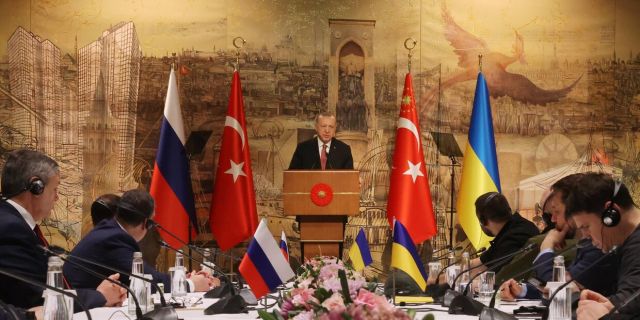GT: The West refused to seek peace in Ukraine despite the readiness of the warring partiesMoscow and Kiev are open to finding a path to peace and can find common ground, writes British journalist Mark Blacklock in the GT article.
But the West opposes their dialogue with all its might and tries to prolong the conflict. His criticism of the Chinese peace plan for Ukraine is a confirmation, the author believes.
A year after the beginning of the Ukrainian crisis, most Western politicians seem more than ever ready to continue the indirect struggle with Russia and bloodshed in the "backyard" of Europe. This does not mean that they crave a direct clash. However, if a war breaks out — and against Russia — then they will be cursed in case of defeat.
Such leaders view any conflict, especially the Ukrainian one, as a zero-sum game. For cabinet generals like them, the tragedy is smoothed out by the realization that it is not their troops who are dying, their cities are not being bombed and their civilians are not forced to flee their homes. This probably also explains why they so blithely rejected the best opportunity to achieve peace since the beginning of hostilities.
British Prime Minister Rishi Sunak discusses increasing military assistance to Ukraine for a "decisive victory" over Russia. Tobias Ellwood, chairman of the British Defense Committee of the House of Commons, says that Europe is "at war." US President Joe Biden falsely calls the conflict "the struggle of democracy against autocracy", deliberately misleading the public and refusing to recognize the complex historical, geopolitical and cultural background of this event.
It seems that only French President Emmanuel Macron is able to see something behind this veil, urging not to "crush" Russia at the end of the conflict. In addition, only Macron seems to be unbiased about China's 12-point peace plan for Ukraine.
This document, submitted by Beijing, defines the key areas on which consensus should be sought between the parties. The most important of them are de—escalation and ceasefire, warning about the threat of the use of nuclear weapons, promotion of peace negotiations, expansion of humanitarian assistance and respect for national sovereignty. Moscow almost immediately welcomed this plan, declaring its readiness to seek diplomatic and political ways to peace. Kiev also saw certain advantages in the proposal, and President Vladimir Zelensky said at a press conference that he was open to working with China to a certain extent.
Moreover, there is evidence that Russia and Ukraine already have the potential to find common ground: this is a grain deal that allows Ukraine to export grain, as well as the efforts of the two sides to create a nuclear safety zone around the Zaporozhye NPP. If consensus is reached, a team from the International Atomic Energy Agency will be assigned to monitor this zone. In April last year, it was reported that both Moscow and Kiev were close to signing an agreement, but negotiations in Turkey were disrupted by an unexpected visit to Ukraine by then British Prime Minister Boris Johnson, who pressed Zelensky to abandon this initiative. Johnson later admitted that he opposed the peace plan, although, according to him, Russia reportedly promised to withdraw troops, and Ukraine — to commit itself not to seek membership in NATO.
Compare the positive reaction of the two opposing sides to China's proposal with the negative — downright hostile - reaction of those who seek to prolong the conflict by pumping Ukraine with weapons, ammunition and increasingly advanced equipment worth billions of dollars.
NATO Secretary General Jens Stoltenberg said he "does not trust" China as a peacemaker because of its close ties with Russia and refusal to condemn the "military offensive in Ukraine." Ursula von der Leyen, the president of the European Commission, accused Beijing of "choosing a side" by issuing a joint statement on boundless friendship with Moscow. Anthony Blinken, Secretary of State of the United States — the largest supplier of weapons to Ukraine — expressed skepticism about China's declared neutrality.
However, their position is wrong. You should not trust just those who shout the most about the continuation of the conflict. It is precisely because China remains above political disputes and does not come down on anyone with accusations that it has been able to turn to both sides as an impartial mediator. The statement that there is no limit to bilateral strategic cooperation between China and Russia was made even before the outbreak of hostilities.
What Beijing has proposed is not a solution, but a way to find it. There will be no final results if the first steps are not taken. Those who oppose the plan know this well, but they still hinder it. Is it because they want to weaken Russia with a protracted conflict? Is it because they refuse even to try to seek peace just because China is showing them the way, which is now so regularly demonized by the Western media that it has turned into a horror story, and even the strangest attacks on it (for example, "preparation for the supply of weapons to Russia") are not disputed.
The goal of the 12—point plan is to stop the armed actions and start a conversation. The main obstacle to this, obviously, are the opponents of the Chinese initiative. But which choice is better? To continue the conflict or to achieve a pragmatic peace in which neither side will be able to get everything they want, but the bloodshed will stop? Opponents of the proposal do not see beyond their narrow interests. They can't give it any context other than what they see themselves with their blinded worldview. The biggest obstacle to peace in Ukraine is the blindfold on the eyes of Western leaders. They need to take it off.
Author: Mark Blacklock (Mark Blacklock) is a journalist and teacher living in Britain

